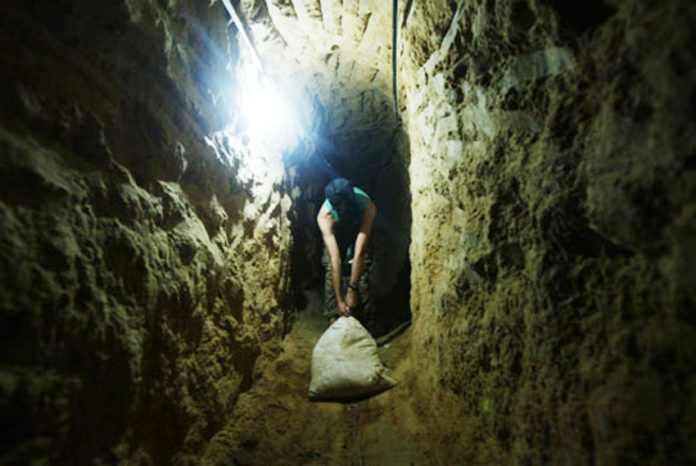AL-AQSA TV on Sunday morning carried the following ‘urgent’ screen caption: ‘Residents on the Egyptian side of Rafah are angry because the Egyptian army intends to evacuate them from their houses to create a buffer zone with the Gaza Strip.’
The privately-owned Qudsnet news website reported on Sunday: ‘The Egyptian authorities have been trying to create a buffer zone along the Egyptian-Gazan border lately.
‘A source told Qudsnet on condition of anonymity today that the Egyptian army has recently been carrying out demolitions and removing agricultural harvest in order to create an area that will be almost completely empty, so they can build a buffer zone with the Gaza Strip.
‘The source added that the army is moving anyone around the area near the border with the Gaza Strip to a distance of 250-300 metres away, so that it can mobilize its forces, including vehicles and tanks belonging to Egyptian forces, along the border with greater ease.
‘The source said that the aim of creating this buffer zone is also to completely demolish all the tunnels along the border line with the Gaza Strip and prevent the construction of any new smuggling tunnels.’
Egyptian security forces in North Sinai on Sunday destroyed five tunnels, which were used to smuggle commodities into Gaza Strip, according to an official source.
The source said three tunnels were found at semi-deserted houses close to international borders, which were evacuated and demolished. No casualties were reported.
Another tunnel was used to smuggle cars, the source said, adding the fifth was used to transfer goods and fuel into the enclave.
Also on Sunday, Egyptian state-owned Channel 1 TV carried a live two-way with its correspondent, from outside the Interior Ministry headquarters in Cairo, to give more information about the arrest of al-Qaeda-linked suspect Adil Habbarah, who according to the reporter is ‘al-Qaeda’s organisation leader in Sinai’ and the one who led the killing operation in Rafah, otherwise known as the ‘second Rafah massacre’, which killed 25 members from Egypt’s Central Security Forces.
The prime suspect and two personal guards were arrested at a trade zone area in the city of Al-Arish, North Sinai, the Nile News correspondent said.
Habbarah was there to purchase ‘explosive materials,’ he added.
The names of the two aides are ‘28-year old Ahmad Muslih Sulayman and Ali Muslih Sulayman, who is 24 years of age,’ he said.
The reporter claimed that the al-Qaeda-linked suspect ‘always wears an explosive belt’ and is a fugitive from two previous death penalties, one for being involved in 2004 Taba bomb attacks and a murder case at his hometown in Al-Sharqiyah, north of Cairo.
The suspect and the two aides were being interrogated by security services in Egypt.
Further information will be revealed following the interrogation sessions held with the convicts, the reporter told Nile News during his two-way.
Meanwhile, Egyptians who had been detained in Gaza were released after the intervention of Egypt’s ambassador to Palestine Yasir Uthman, Assistant Foreign Minister for Consular Affairs and Egyptian Expatriates Ali al-Ashri told Egyptian state-run news agency MENA on Saturday.
The Palestinian authorities launched a probe over financial irregularities charges that were levelled against the Egyptian nationals, said the diplomat.
Earlier, Hamas security forces in Gaza arrested head of the Egyptian community in Palestine Adil Abd-al-Rahman.
Fifteen Hamas policemen stormed the Egyptian culture centre in Gaza where they arrested Abd-al-Rahman and confiscated many computers.
Two weeks ago, Abd-al-Rahman expressed his support for the Egyptian army and decried targeting Egyptian state institutions.
Suez security chief Major General Khalil Harb denied on Saturday news claiming that security forces arrested a Palestinian woman affiliated to Hamas Movement while carrying a firearm.
Security troops seized an Egyptian woman in a hotel in Suez and released her after checking her identity, Harb explained.
l Militants believed to be supporters of the deposed Libyan leader Mu’ammar al-Gadaffi provoked clashes in the Libyan town of Sirte from the evening of 31 August, the official Libyan WAL news agency reported.
The clashes, which left some wounded, continued until the afternoon of 1 September, having begun when ‘an armed group considered to be followers of the previous regime’ attacked local shops, WAL said.
Sunday 1 September also marked the anniversary of the accession to power of Al-Gadaffi in 1969, who was born on the outskirts of Sirte.
Libyan prime ministerial sources on Sunday described a report it said had been made by the Al-Arabiya satellite channel claiming interim premier Ali Zaydan’s headquarters had been fired upon on 1 September as false, according to an official Libyan WAL news agency report at 1031 gmt on the same day.
The sources said the report ‘has no basis in truth’ and that ‘the situation is very calm and normal and no incidents have been recorded, either at the prime ministerial headquarters or in their vicinity’, WAL said.
At 0805 gmt on 1 September, the Libyan Al-Tadamun News Agency had reported that ‘a volley of bullets’ had been fired at the premier’s headquarters at dawn, something it said had been confirmed Hashim Bashar, the ‘chairman of the Interim Supreme Security Committee’.
Libyan Foreign Minister Muhammad Abd-al-Aziz has said Egypt will boost cooperation with Libya in the judicial and diplomatic domains.
In statements following a meeting in Cairo on Sunday with Egyptian Foreign Minister Nabil Fahmi, Abd-al-Aziz said Libya wants to draw on Egypt’s experience in the judicial domain, especially with regard to handing over ex-Libyan regime acolytes in Egypt and restoring stolen money.
He added that Egypt will open the door for Libyan diplomats to be trained in Egypt.
Abd-al-Aziz also said the talks also tackled means of enhancing bilateral cooperation in the security domain and border safeguarding.
He added that the talks addressed Egypt’s possible contribution to rebuilding Libya and bolstering cooperation between the private sectors of both sides.
The talks also tackled regional and international issues of mutual concern, especially the Palestinian and Syrian problems.
